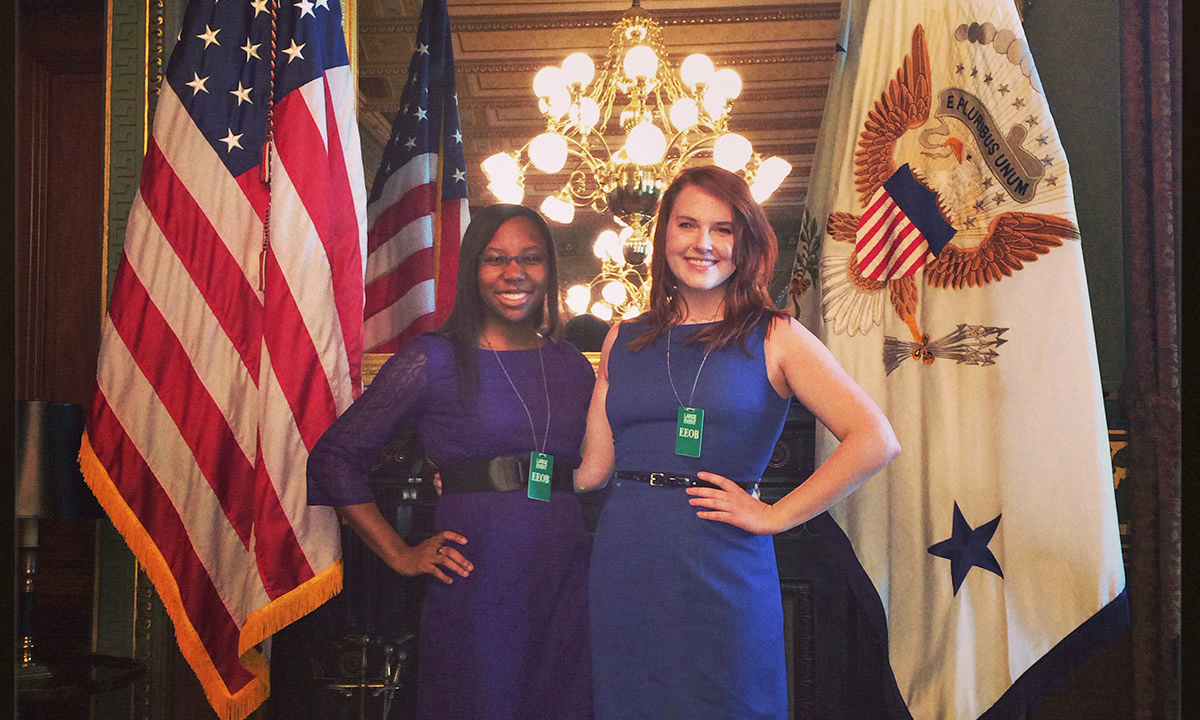Students help shape White House efforts to prevent sexual assault
News
Recommendations from a White House task force to prevent sexual assault on college campuses include key contributions from two James Madison University students.
Kim Johnson, a first-year graduate student in psychological sciences from Springfield, Va., and Raychel Whyte, a senior health sciences major from Manassas, Va., were invited to the White House on three separate occasions this semester to advise President Obama's White House Task Force to Protect Students From Sexual Assault. The two were also present for the formal release of the task force's report on April 29.
"It was very flattering to be invited and also just to be around so many people who are on the same frequency as us in thinking about these ideas and ways to help further what we're trying to do," Johnson said.
"It was very flattering to be invited and also just to be around so many people who are on the same frequency as us in thinking about these ideas and ways to help further what we're trying to do." — Kim Johnson
Johnson is the University Health Center's graduate assistant for sexual violence education, advocacy and support. She is also the advisor for the JMU student organization Campus Assault ResponsE (CARE), and she and Whyte are co-coordinators of JMU's Red Flag Campaign chapter and Take Back the Night.
After representing JMU at a Red Flag Campaign conference in Richmond in November, the program's coordinator extended an invitation for Johnson and Whyte to attend a listening session Feb. 21 at the White House. They joined 13 other college students and recent graduates from around the country in the vice president's ceremonial office for a 90-minute meeting with Lynn Rosenthal, the White House advisor on violence against women; Kathleen Sibelius, then secretary of the Department of Health and Human Services; and members of various organizations and advocacy groups.
In March, Johnson, Whyte and a doctoral student from the University of Maryland were invited by Vice President Joe Biden's staff to return to the White House, where they helped brainstorm content for notalone.gov, a website designed to support sexual assault survivors and to track enforcement. And last month the vice president's staff summoned them once again for a "data jam," during which the students were asked for their input on a series of web-based sexual assault apps under development.
Two of the students' suggestions were adopted as part of the task force's final report. The first is that colleges and universities survey students about their perceptions of sexual assault and other "campus climate" issues. Johnson said such a survey is in the works at JMU. The second recommendation is that schools take into account the LGBT community, whose victims may be less inclined to speak out in the wake of sexual violence.
Whyte, a May graduate, served on a panel during the White House ceremony that highlighted key points in the report. She said the task force is bringing much-needed awareness to the issue of sexual assault and sexual violence on college campuses, and social media can be an important resource for victim advocacy.
Johnson said one of the key things that JMU students need to understand is that consent is "not the absence of ‘no,' but the presence of ‘yes.' It's important that people understand what the line is and when it's crossed."
# # #

